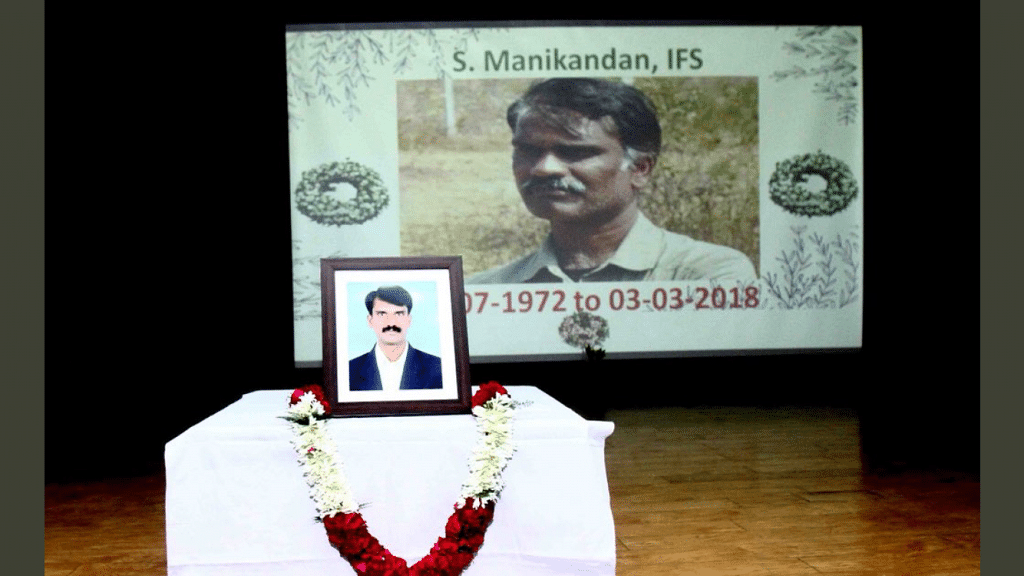Indian Forest Service officers claim they aren’t recognised for their work unlike IAS & IPS cadre.
New Delhi: It is the other IFS in the pantheon of India’s civil services, with the ‘F’ standing for the unglamourous ‘forest’ as opposed to the high profile ‘foreign’ service.
And the death of senior Indian Forest Service (IFS) officer S. Manikandan, who was killed by a wild elephant in a forest in Karnataka, has brought to the fore the silent, incessant ordeals faced by this lesser-known category of civil servants in their line of duty.
The tragedy, ironically, took place on World Wildlife Day (3 March). However, while condolences for Manikandan came from politicians, including the Prime Minister, IFS officers claim that unlike IAS and IPS officers, forest officers are often neglected by the political class.
They also say that incidents like Saturday’s are “routine” for the officers of the cadre, who have to work amid uncertainties and hazards of wildlife.
“When we enter the profession, we know we will encounter hazardous situations, so one cannot complain,” said Jitendra Sharma, principal chief conservator of forests and head of forest force, Punjab.
“Saying our job is unsafe is like a soldier saying fighting a war is unsafe,” he added.
The forest soldiers
The broad mandate of the IFS entails “the implementation of the National Forest Policy which envisages scientific management of forests and to exploit them on a sustained basis for primary timber products, among other things.” Constituted in 1966 under the All India Services Act, 1951, the IFS has a cadre strength of 3,152 officers.
The perils involved in the line of duty do not pinch as hard as other pressures IFS officers have to navigate. “Dealing with the land mafia, mining mafia, Naxal problems and above all, political pressures makes their job much harder,” he said.
Given that unlike the IAS and IPS officers, the work done by IFS officers is not “an immediate concern” for either citizens or politicians, the political class takes no interest in their workings, he said.
Dipika Bajpai, deputy conservator of forests, who was verbally assaulted by an MLA in 2016, agrees. “Politicians and people at large see us as ‘obstructions to development’,” she said.
“Every other profession is glamourised. If soldiers make sacrifices, everyone talks and knows about it. But because the work we do does not have immediate tangible benefits, nobody talks about it,” she rued.
Institutional neglect
Technically, IFS officers are eligible to be deputed to the central government. But in reality, it is much harder for them to make it to the government in comparison to their IAS and IPS counterparts. An evidence of this trend is the fact that even the joint secretary heading the IFS division in the ministry of environment and forests is an IAS officer, said a senior IFS officer, speaking on condition of anonymity.
“Within the ministry, forests are completely neglected,” the officer added. That IFS officers often operate in remote areas, far away from the power centres and state capitals, is only part of the reason, the officer argues.
“There is an unsaid consensus among the political class and the IAS lobby to not let IFS officers rise to the secretary level…Forget about other ministries, why are there so few IFS officers in the environment ministry itself?”
Salaries and rewards
While there may be rationale behind dominating ministries with IAS officers, who are “direct agents of development”, there is discrimination even in salary structures and rewards, argues Bajpai.
“Who will talk about our salaries when the bodies meant to deliberate these issues are dominated by IAS officers,” she asked as she pointed out that IFS has the most stringent eligibility criteria among the all-India services, with only those with science backgrounds eligible to apply.
While IPS officers, who too encounter hazardous situations, are routinely rewarded for their duties through President’s Medals and other awards, there are no such awards for IFS officers, Bajpai says.
“Is there no award for someone like Manikandan who died in the line of duty only because he was not catering to a vote-bank,” she asked.
